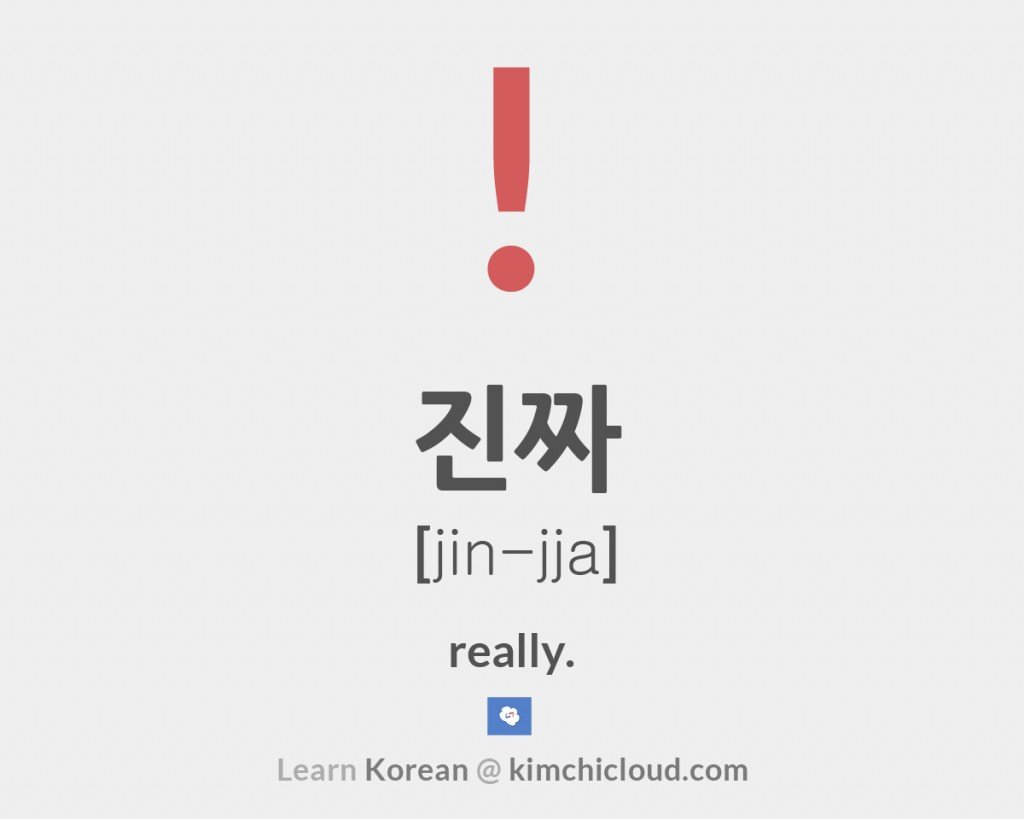진짜 / 정말 – How to Say Really in Korean
Really in Korean
In this lesson, we will take a look at the different ways to say “really” in Korean. However, before we start, it is probably a good idea to get some things sorted out first. In English, the word “really” can take on multiple meanings; to express sincerity and make it clear that something is in fact true, and to mean “very”. The same holds true for Korean, and thus the translation becomes pleasantly smooth. We will introduce two words, and the first one we will take a look at is one you might already be familiar with, as it is one of the more popular Korean words among learners of the language, and commonly encountered in K-dramas:
jinjja
In Hangul: 진짜
jinjja (진짜) can be used in most situations to say “really” in Korean. As stated above, it is one of those words you will learn early on and use all the time. It can be used as a question to mean “really?”, and can take on the meaning of both “very” and “for real”. More literally, it means “real” and “genuine”, as opposed to its antonym “fake.” This subtle connotation may or may not seem all that important to you, and it really isn’t if you are just starting out. However, it can be good to know when you become a more advanced speaker, in case you want to distinguish it, on a more advanced level, from the second word we are about to introduce, which is:
jeongmal
In Hangul: 정말
jeongmal (정말) can be used in almost every situation, and just like jinjja (진짜), it can be used as a question, and mean both “very” and “for real”. Please note that when used as as a question, neither jinjja nor jeongmal would ever mean “very?” (which sounds awkward in English of course). In other words, when used as a question, both of these words would only mean “really?”.
Both of these words are mostly similar in their uses, although their actual, literal meanings differ slightly. jinjja (진짜), as we previously describes, resembles the English words “real” and “genuine”, while jeongmal (정말) is leaning more towards the English word “truth”, as opposed to “lie”. In other words, when distinguishing these two words, think of their antonyms. Furthermore, both of these words can be used as either a noun or as an adverb.
The particle ro (로) at the end?
When used as an adverb, you will sometimes see the particle ro (로) added at the end of both these words, like jinjjaro (진짜로) or jeongmallo (정말로). This particle can be omitted or added without any change in meaning. However, if the particle is used, neither of this words can be used as a noun.
The Casual/Informal Way to Say Really in Korean
When speaking with younger people, close friends or family, we can simply use the plain form of the two words we just learned to say “really” in Korean. Make sure not to use this form with people you don’t know very well, and especially older people, or people of “higher status”, which means teachers (assuming you are a student), bosses (assuming you are their subordinate) and so on.
- jinjja (진짜)
- jeongmal (정말)
You can also turn these phrases into sentences by raising the tone at the end.
The Polite Way to Say Really in Korean
If you’re talking to someone whom you’re not close with and want to say sentences such as “I’m serious”, “I mean it” or “Really” in Korean, you can take either of the aforementioned words and make them polite and proper to use with older people, seniors, bosses, teachers, etc. To do so, however, you need to add the syllable yo (요) at the end, like this:
- jinjjayo (진짜요)
- jeongmalyo (정말요)
You can also turn these phrases into sentences by raising the tone at the end.
The Formal Way to Say Really in Korean
If you’re talking to someone you’re not close with and want to say sentences such as “I’m serious” or “Really” in Korean, you can use both of the aforementioned words and create a sentence. To do so, they need to be attached to and conjugated with the copula ee-da (이다) which literally means “to be”. ee-da (이다), which is the vocabulary form, is then conjugated into the polite, formal form imnida (입니다). Don’t worry if this sounds complicated. If it does, just focus on learning the complete phrase (that’s how it should be learned anyhow), instead of driving yourself mad with thinking about conjugations, rules and grammar.
- jeongmalimnida (정말입니다)
- jinjjaimnida (진짜입니다)
You can also turn these phrases into sentences by changing the ending, like this:
- jeongmalimnikka (정말입니까)
- jinjjaimnikka (진짜입니까)
Examples
Ex. 1
정말요?
[jeong-mal-yo]
= Really?
Ex. 2
나는 진짜 맥주가 싫어.
[na-neun jin-jja maek-ju-ga shir-eo]
= I really dislike beer.
Ex. 3
정말 듣고 싶은 말
[jeong-mal deut-go shipp-eun mal]
=words (I) really want to hear
Ex. 4
A: 김우빈 진짜 잘생겼어요.
[Kim-Woo-Bin jin-jja jal-saeng-gyeoss-eo-yo]
= Kim Woo-Bin is really handsome.
You might want to check out or lesson on how to say ‘handsome’ in Korean.
Ex. 5
A: 정말 좋아해요.
[jeong-mal joh-a-hae-yo]
= (I) really like it.
This concludes this lesson on how to say “really” in Korean. Try not to think too much about the differences about the two words taught in this lesson. However, it is good to know that they exist, and what they are. For more lessons like this one, please check out our Everyday Korean Archive! If you found this articles helpful, please like or share! If you have any questions or something else you would like to say, make sure to leave a comment below and we will do our best to help you out.





